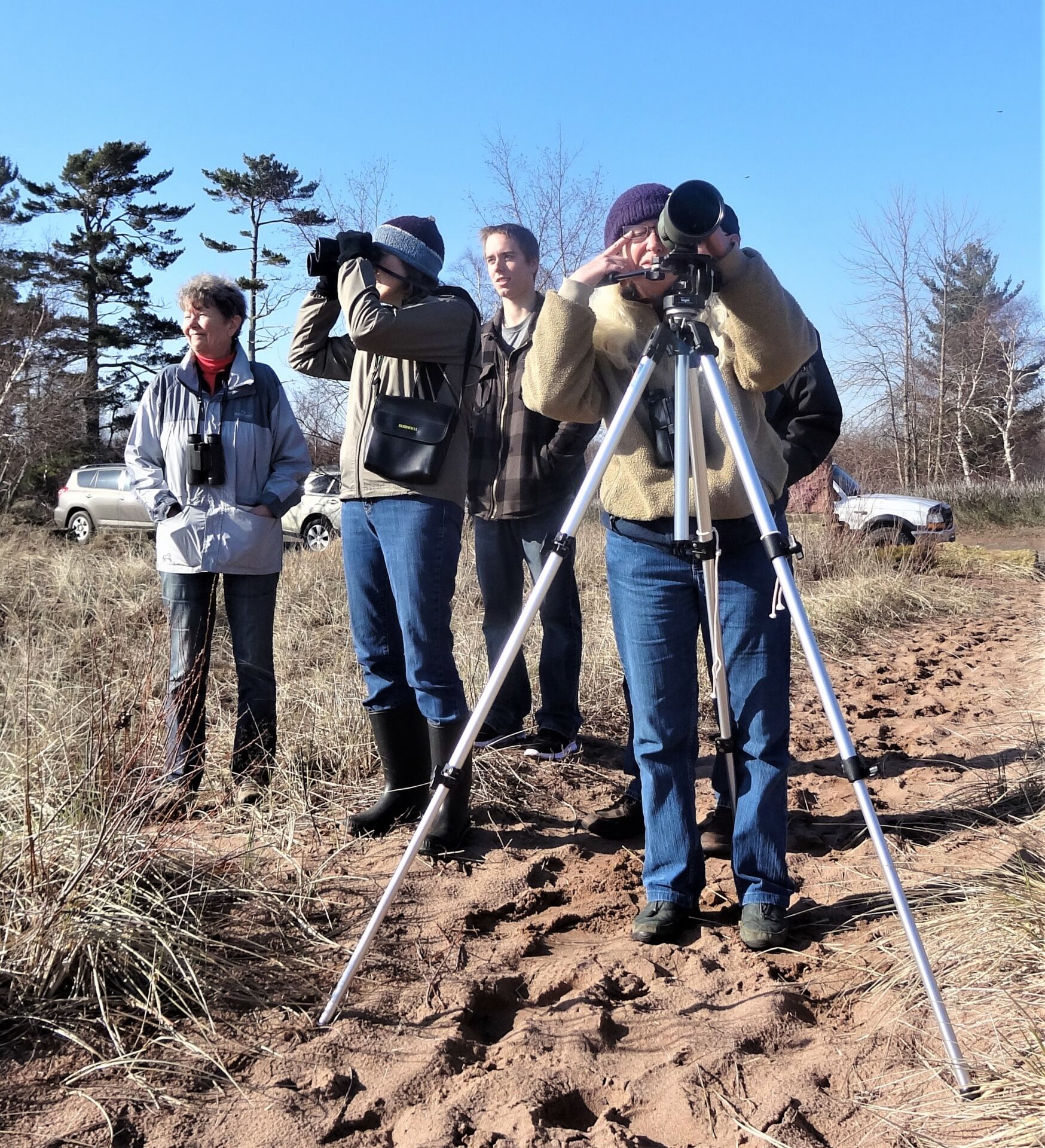It’s been said that the average person changes careers multiple times during a lifetime. Mary Lou Reeb just packed all of hers into the same organization.
Reeb, 63, has spent the bulk of her career with the University of Wisconsin Sea Grant Institute and Water Resources Institute (WRI), first as UW Sea Grant’s finance and budget specialist (seven years), then UW Sea Grant assistant director and education coordinator, and, for the last twelve years, also assistant director for the WRI. At the end of June, she officially retires from an organization she’s spent the last 36 years serving.
As she approaches her latest career milestone, she’s put in mind of the famous quote by the late Steve Jobs: “You can’t connect the dots looking forward. You can only connect them looking backwards.”
“When I thought about it, I realized this could have been a plan if I had made a plan,” said Reeb. “Instead, you just fall into something. “
Family Influences, Branching Career Path
That something had its origins in Green Bay. Reeb’s family was a stoic combination of old-school fishermen and Menonnites. Inspired by the public-service vibe of the Kennedy era and her family’s emphasis on education—her mother, one of 13 children, went back to get her GED as an adult—Reeb graduated from UW-Madison with a degree in education.
And then she decided to become an accountant.
“At that time, the job market for teachers was tight, and I thought, everyone needs someone who can count money,” said Reeb. “This is just the start. That was the logic of it.”
Her first impression of UW Sea Grant left a little something to be desired. When she began in 1976, the program was housed in, of all places, the UW’s former poultry science building at 1800 University Ave. The environs were cramped, fragrant and less than ideal.
Dan Marklein, who began his own extended UW Sea Grant career as Reeb’s assistant, still remembers the look of horror on her face when she finally saw her office. “The ceiling had exposed plumbing and the drain from the upstairs toilet passed directly over her office,” he recalled. “Every flush was announced with a gushing sound of running water right overhead. To this day I still wonder if she had asked where she’d be sitting whether the whole course of our history would have changed.”
As assistant director, Reeb moved to the building’s second floor. “My fire escape was a rope tied to my radiator. Luckily, I was young and reasonably fit. I thought, ‘At least they gave me a strong rope.’”
Marklein and Reeb would spend the next three-plus decades as colleagues and friends, growing and maturing with the program. Today, he’s the one serving as the program’s fiscal officer. He remembers the two spending long nights crunching omnibus budget numbers with clunky calculators and number-two pencils, the threat of a single accounting error sending the process all the way back to square one.
He also recalls Reeb’s reaction to his discovering what he thought was an error in a rosy financial report. Even though the report eventually proved accurate, Reeb didn’t hesitate to take the heat from UW Sea Grant’s current director Bob Ragotzkie.
“Ragotzkie could be a little excitable. I expected to see her body come falling past my first floor window,” joked Marklein.
Accomplishments Begin to Stack Up
Her colleagues credit her with keeping the program’s financial ship in working order, integrating Wisconsin’s Water Library into the program and helping set up story hours at the Boys and Girls Club on Madison’s Allied Drive. But Reeb’s crowning accomplishment may well be creating and piloting the Madison JASON program, the local version of marine explorer/Titanic discoverer Bob Ballard’s national tele-science program in 1995. For a couple of weeks each spring, Reeb, Marklein and UW Sea Grant staffers would gather Madison teachers and up to 300 fourth- through ninth-grade students together to watch and interact with scientists via a two-hour broadcast and participate in their own science experiments.
It wasn’t always a smooth process. In the beginning, JASON broadcasts were staged in the sometimes beer-soaked rooms of UW-Madison’s monolithic Union South, an arrangement that meant that broadcast equipment had to be taken down and stored each night.
“That was crazy,” Reeb recalled. “It was always in the back of our minds—is our connection going to go up again the next day?” At one point, an elementary-school-aged student raised his hand to ask Reeb if she were Mrs. Bob Ballard.
After a rocky start, Reeb ended up going out to the Promega Corporation—an unofficial first contact between the UW and the Fitchburg biotech company—and convinced them to let her use their state-of-the-art auditorium to host the JASON program free of charge. The program was wildly successful. lt would run until 2006, involving a total of 495 teachers (83 percent of them women) and 22,000 students.
The Value of Colleagues
The teamwork that fueled the Madison JASON project is one of the things that kept Reeb at UW Sea Grant for the bulk of her career.
“Quite honestly, it’s the team we’ve assembled and the fact that they have chosen to stay with us,” said Reeb. “When someone has come into our organization, they’ve essentially become a lifer. We’re doing creative projects to engage them, use their talents and make it a benefit to them personally and well as professionally. That, to me, is the greatest accomplishment.”
In that same spirit, Reeb appreciates what each of UW Sea Grant’s three directors have brought to the program in addition to their scientific accomplishments—Bob Ragotzkie’s focus on administrative structure, Anders Andren’s emphasis on technology and now Jim Hurley’s efforts to integrate graduate students into the program.
With Marklein’s help, Reeb built the framework that will facilitate the latter, creating a system to track the hundreds of graduate students who have worked with UW Sea Grant over the last 44 years. The database, first begun by staffers using a manual typewriter in 1968, has allowed the program to survey its students about the impacts they’ve had on the world.
Like many UW Sea Grant staffers who’ve retired in recent years, Reeb plans to remain attached to the program. While she’ll spend the bulk of her time training her papillons—Tucker and Keeper—to become therapy dogs for assisted-living facilities, libraries and hospitals, she also plans to continue volunteering with Wisconsin’s annual Lake Sturgeon Bowl competition.
“It’s nice to be able to love a program and still be able to leave it,” said Reeb. “I like to recall the advice my mother always gave me: Stay young. I take that to mean intellectually young. Things will always work out and doors will always open.”





